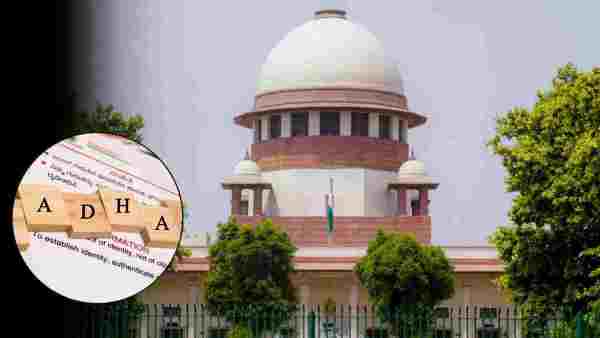
Aadhaar vs. Allegiance: Raising concerns over individuals who obtained Aadhaar cards, the Supreme Court has questioned whether non-citizens holding Aadhaar should also be granted voter rights. The bench highlighted that Aadhaar was created to ensure social welfare benefits reach everyone and must not automatically serve as proof for electoral participation. This distinction has sparked widespread discussion about the intersection of identity verification and democratic rights.
The bench, led by Chief Justice of India Surya Kant and Justice Surya Kant, is currently hearing petitions challenging the Election Commission’s Special Intensive Revision (SIR) of voter lists in several states. Petitioners argue that the process raises serious questions about fairness and inclusivity, especially in rural and illiterate populations. This case has become a landmark debate on the election process in India.
The Supreme Court clarified that Aadhaar does not confer absolute proof of citizenship. “That is why we said it will be one of the documents on the list of documents,” the bench observed. Any deletions from voter lists must follow a formal notice and verification procedure. The court emphasized that the legal framework explicitly separates the issuance of Aadhaar from citizenship rights, preventing misuse for electoral purposes.
Chief Justice Surya Kant explained that Aadhaar is primarily a statutory tool for accessing welfare benefits, not voting rights. He raised a hypothetical scenario: “Just because someone receives ration benefits through Aadhaar, should they automatically become a voter? What if that person belongs to a neighbouring country?” The court stressed that Aadhaar is meant to ensure social welfare, not serve as a ticket to the ballot box.
The Supreme Court also highlighted the Election Commission’s authority to verify the authenticity of documents submitted with Form 6 applications for voter inclusion. The poll body is not a mere post office delivering approvals without scrutiny. This ensures that document verification is stringent and helps maintain electoral integrity.
The court has set a schedule to hear petitions specifically challenging SIR in Tamil Nadu, Kerala, and West Bengal. The Election Commission has been asked to respond by December 1, after which petitioners can submit rejoinders. The upcoming hearings, under active judicial scrutiny, are critical developments in ongoing court proceedings regarding electoral fairness.
Senior Advocate Kapil Sibal, representing several petitioners, argued that SIR places an unconstitutional burden on ordinary voters, particularly illiterate individuals. Many cannot read or write, and filling out forms may lead to their exclusion from electoral rolls. The court was urged to prioritize democratic participation over procedural technicalities, ensuring no citizen is disenfranchised.
Sibal also noted that once a voter is included in the electoral roll, a presumption of validity applies unless the state proves otherwise. Exclusion must follow a reasonable and fair process. Aadhaar, while not conclusive proof of citizenship, creates a presumption in favour of the holder. This highlights the importance of constitutional safeguards in protecting citizens’ electoral rights.
Justice Bagchi emphasized the necessity of removing dead or inactive voters from the rolls. He noted that voter lists were publicly displayed in panchayats and on official websites, and no decisions are made in a vacuum. Such measures are vital for maintaining electoral integrity and ensuring fair and accurate representation in democratic processes.